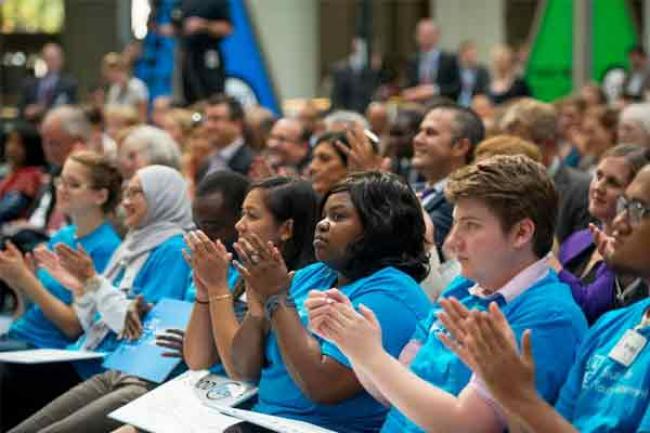Just Earth News 06 Oct 2016, 06:31 am Print

“Young people are often seriously affected by conflict. Decisions made by earlier generations may affect them for their entire lives. They need and deserve a place at the table, if they are to be fully engaged in peacebuilding, economic and social development and building effective, inclusive institutions,” said the UN deputy chief at an event this afternoon at UN Headquarters in New York on youth leadership in peace and security.
Eliasson noted that the world now has more young people than ever before in human history, with 46 per cent of the global population younger than 25 years old. Africa and the Middle East have the highest proportion of young people – about 60 per cent of the population.
“This presents a unique opportunity for developing innovative solutions for peace and development. But far too often, the political lingo around young people focuses on the problems they allegedly present. Sadly, young men are portrayed by some as frustrated potential extremists and young women as passive victims,” he said.
“This runs counter to the fact that the vast majority of young people around the world are practical idealists with strong values, who have a commitment to peace and a life in dignity for all. They are agents of change in their communities and societies. They are subjects of positive action, not objects to be contained or manipulated,” he added.
Highlighting that young people should be “valued for their potential and promise, not seen as a peril or problem,” Eliasson emphasized that an important way to counter damaging and inaccurate narratives is to amplify and strengthen the voices of young men and women themselves.
He pointed out that the UN Security Council had recognized the crucial role of young people as peacebuilders in December last year, when it adopted resolution 2250 on youth, peace and security.
“This was an historic step towards recognizing the need for an active role of youth in making and building peace – just like resolution 1325 established the same role for women 15 years ago. I hope we will move faster on the youth track than we did on the women track,” Eliasson said.
The Deputy Secretary-General also highlighted that in June, the UN Peacebuilding Fund launched its Youth Promotion Initiative, which offers youth organizations financial support to implement peacebuilding projects. The Fund is operating in 15 countries to advance Security Council resolution 2250.
Noting that the first anniversary of resolution 2250 is approaching, he said that a growing focus on the positive role young people can play in promoting peace has already been visible.
He also said that the Progress Study on Youth, Peace and Security mandated by resolution 2250 will show how new forms of engagement between the UN, civil society and young peacebuilders can strengthen the voices of young people.
“It aims to remedy their historic marginalization and exclusion. It should provide ways for young people to address not only youth-specific issues, but the full range of the peace and security agenda,” the Deputy Secretary-General said.
Beyond the Progress Study, much work remains to be done, Eliasson emphasized, pointing to the Youth Delegate Programme to the UN as an important first step. However, he noted that only 30 out of 193 Member States currently send youth delegates, and encouraged other governments to do so.
In addition, the Deputy Secretary-General said that other important measures that can be taken to turn resolution 2250 into a reality include funding youth organizations on the ground – particularly small and local ones; recognizing the need for gender-sensitive approaches to youth inclusion in political processes; and holding Member States accountable for protecting the human rights of young people, respecting their freedom of speech, and their right to education and employment.
In that regard, he noted that the recently appointed Special Envoy on Youth Employment, Werner Faymann, will be a strong advocate, together with the Youth Envoy, Ahmad Alhendawi, in tackling key youth employment challenges.
“This will bolster our efforts in enhancing opportunities for decent work for youth around the world,” Eliasson said.
“You, the young leaders here in this room, have the key both to the present and the future. You need and deserve a say in decisions that will affect your lives,” he added.
On Tuesday’s event was co-organized by the Permanent Missions of Eritrea and Finland, the Finn Church Aid and the UN Development Programme (UNDP).
Photo: World Bank/Grant Ellis (file)
- Ali Khamenei (1939–2026): Iran’s Supreme Leader who ruled with an iron grip
- Trump signs 10% global tariff, says it takes effect ‘almost immediately’
- BJP wins a seat in Bangladesh — But not the one you think!
- Meet Shabana Mahmood: Could she take over as UK’s first Pakistani-origin Muslim PM?
- Dalai Lama's Office breaks silence on Epstein claims





-1763561110.jpg)
